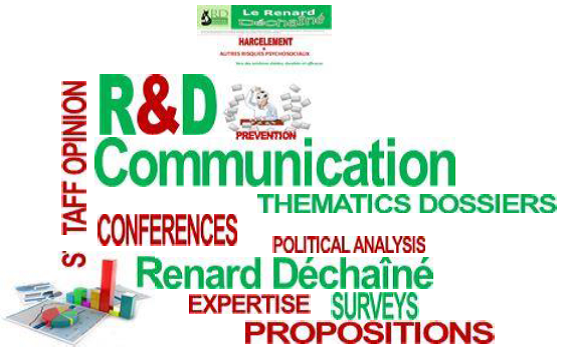to defend the rights of the workforce more effectively and to oppose the excesses of the administration
In responding to a perfectly clear demand of staff during the last election campaign for the election of the Brussels LSC, all representative OSPs committed themselves to implement a reform of the organisation and functioning of staff representation which would enable it to operate with maximum efficiency and defend the rights of colleagues with to the best of its ability.
For R&D, this is not about a ritual but rather a serious commitment vis-à-vis staff, which we intend to implement in practice and to honour in every possible way.
This also concerns the scope of our analysis for each case we have to deal with, in order to represent and defend the rights and expectations of staff and to oppose the excesses of the administration.
We must end the superficial and self-referential approaches from administration
Indeed, very often the various issues are presented and managed by the administration by improvisation, in a politically oriented manner and without taking into account the best practices observed in the other institutions, other international organizations and Member States.
This aim of this totally artificial “isolation” is often to avoid seriously addressing the problems as well as the consequences of reported malfunctions.
With the publication of its “Renards déchainés”, federal R&D conducts in depth analyzes and puts the institution face to face with its responsibilities.
Given the above, for each key staff policy file, alongside its usual communications, R&D is committed to make available thematic dossiers to colleagues and the institution, namely special editions of our “Renard déchainé“, taking into account the latest scientific developments and the best practices and experiences in the field.
As the first union at all institutions, these analyzes will be conducted naturally at the federal R&D level to take into account also the best practices in all institutions.
Our aim is to make available real reference texts on the subject matter to all players.
Each thematic file have a political analysis of the situation in our institution as an introduction, highlighting the often serious dichotomy between the good intentions of the institution and the sad reality within the services.
In this context, to enrich its analysis, R&D will continue to organise conferences by inviting experts from the relevant field.
On this basis and as the conclusion of each thematic file, R&D will present detailed operational proposals which can overcome the problems which were identified.
R&D is committed to defending these proposals before the administration, in so far as possible in ensuring the largest possible trade union unity, which is an absolute prerequisite for the effectiveness of the action of the staff representation.
Ensuring full and rigorous analysis and not limiting ourselves to the usual short leaflets , represents a major effort for R&D but is an approach that is needed to, on one side, counter the attempts of the administration to deny and trivialise the problems, and, on the other, to provide a satisfactory solution to these.
Each colleague’s opinion counts
In the context of the increasing number of trade unions and of the cacophony that often results ,the administration has an easy task to question the ability of staff representation to truly express the voices of colleagues.
R&D has always been convinced of the important role to be played by “staff surveys” to allow staff to comment on the key issues of staff policy.
Also in this context, it is essential to ensure greater methodological rigour.
This is not about organising hasty and botched consultations aimed only to endorse pre-established positions.
We must allow each colleague to speak knowingly. This is why R&D is organising its own surveys to support actions necessary to conduct staff defence. This is also why R&D is counting on your help in responding to surveys launched by the union to defend your interests more efficiently!
The above surveys must be effective satisfaction surveys, organised by taking account of the most modern recognised methods and practices from outside our institution.
That is why R&D will be assisted in its efforts by the best experts in the field.
The first thematic dossier that R&D presents to staff concerns psycho-social risks and the glaring gap between the zero tolerance policy declared in this regard, on behalf of the institution, by Vice-President Georgieva and the sad reality of the “non-management” of harassment cases in our services.

